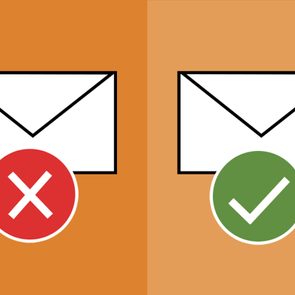What Is an “Irish Exit”—and Is It Considered Rude?

Bailing from a bash? Here's what etiquette experts say about an Irish exit and when the farewell gesture is accepted.
We’ve all been there: You’re mingling at a party and making small talk when fatigue sets in and the itch to leave grows stronger. The host is busy chatting, and there’s a small crowd gathering to start saying their goodbyes. It would be so much easier just to scoot out, unnoticed, you think. It feels like a breach of proper etiquette, but it would save you an awkward farewell and get you home that much faster. There’s even a name for it: the Irish exit (or Irish goodbye). But what is an Irish exit, exactly, and is it a party etiquette mistake?
Each type of social situation generally comes with its own set of rules: business etiquette, wedding etiquette and funeral etiquette all come to mind. But how does an Irish exit fit in? We spoke with Irish author Judith McLoughlin to fully understand this social norm and its origin.
Get Reader’s Digest’s Read Up newsletter for etiquette tips, humor, cleaning, travel, tech and fun facts all week long.
What is an Irish exit?
An Irish exit is when you leave a social situation (a party or larger gathering, for example) without saying goodbye to your host or to other guests.
I’ve been on the receiving end of the Irish exit, and it looks a little something like this. After my husband and I purchased our first home a few years ago, we hosted a large backyard housewarming party. People streamed in and out of my backyard all day, bearing delicious potluck dishes and housewarming gifts. Some people stopped by for an hour while others stayed for several—and I would be lying if I said that I said goodbye to each and every person who came by that day. Several people just seemed to disappear as the afternoon went on, having Irish exited out of my party and onto the rest of their day.
How did the Irish exit get its name?
Also known as an Irish goodbye, it seems to have several origin stories, although one thing is certain: “It’s a term we wouldn’t use in Ireland, so it’s purely an American term,” notes McLoughlin.
McLoughlin points to the 19th-century Irish Potato Famine and the exodus of Irish people, though, as a possible basis for the term blossoming stateside. “It was a very sad time, and the Irish goodbye could have come from that: the sadness of departing and leaving Ireland and never being able to see your loved ones again,” she says.
Of course, there’s another theory. There might be some truth to the term originating with hard-partying Irish Americans. “The Irish have a reputation of drinking a lot—which is true!—but this is more of an Irish American twist.” The idea here is that a person would have had so much to drink that they just needed a quick escape from the party to avoid any embarrassment over how much they had consumed.
What’s the difference between an Irish exit and a French exit?
To be honest, there isn’t much of one besides the country in which the phrase is used. You’ll come across the term “Irish exit” if you’re in the United States. But for our friends across the pond in Great Britain, you’ll hear the term “French leave” or “French exit” to mean the exact same thing: leaving a gathering without relaying your farewells. And in other parts of the world, the phrase is “leaving the English way” (in France, Russia or Poland) or the “Polish exit” (in Germany).
Is an Irish exit rude?
McLoughlin notes that the Irish are mainly known for their exuberantly welcoming nature—and that extends to goodbyes too. So, in Ireland, it would be seen as rude to simply leave without saying goodbye. “The Irish are famous for, if anything, the long goodbye,” she says.
But here in the States, quietly exiting a large party might not be as rude as you think, depending on the situation. Formal gatherings, like weddings or intimate dinner parties where you bring a hostess gift, should prompt you to say goodbye to your host. But larger, informal gatherings (or those that don’t require an RSVP) like a big backyard BBQ? Read the room: If your host is busy with a crowd of people around them or has a line of people queued up to say their goodbyes, quietly slipping out might actually be the more polite way to make your exit.
About the expert
- Judith McLoughlin is an Irish chef and cookbook author based in Atlanta. She is the author of two cookbooks, A Return to Ireland and The Shamrock and Peach.
Sources:
- Irish Central: “What Does the Phrase an Irish Goodbye Mean?”
- Dictionary.com: “Irish Goodbye”
- Quartz: “Is it the Irish goodbye, the French exit, or to leave ‘the English way’? Depends where you live”






